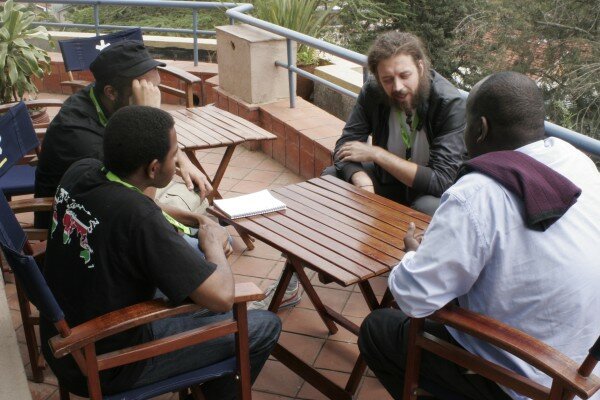
iHub in Nairobi, Kenya
Until now, the African continent has been considered as the “little brother”, when looking at the number of coworking spaces worldwide.
While the total number of African coworking spaces is small, it is growing. Considering that before 2007 there were no “official” coworking spaces Africa, it’s definitely a rising trend. There is a lot of belief that this is only the preview, and a big boom of new coworking spaces in African big cities is on the horizon.
In Africa, more than anywhere else, there is a flood of highly educated young people coming out of universities, who are less likely to be drawn to the traditional 9-5 work model. This new generation possesses an entrepreneurial spirit.
Infrastructure also plays a part in encouraging people to seek out local collective working spaces; it can take forever to get around some cities. And not to forget the most important- African technology scene is booming, especially the mobile market being the fastest-growing one in the world.
Here’s a short & rough overview of the biggest community working spaces currently in the African countries. It might come handy if you’re thinking of exploring the possibilities African countries have in store for you, as many of the spaces are really glad to welcome visitors.
-
Kenya is constantly producing news stories about investors investing more and more into local startups. Europeans and Americans have been starting to see Kenya as a perfect example of an emerging market. A country with crazy demographics (75% of Kenyans being younger than 30 years old), an enormously expanding middle class and highly educated people.
Much of the credit for creating a community of tech startup entrepreneurs and freelancers goes to the team of iHUB in Nairobi. IHub opened its doors in March 2010. In fact, it was Eric Hersman, founder of iHUB, who wrote in 2009 that “African cities need more coworking spaces”.
A new space in Nairobi, called Garage - launching in January 2012- is located in the heart of the city accommodates around 100 workstations. The space also targets European startups and freelancers, who are very welcome to join the crowd already signed up.
Nairobi is also known for its business incubation labs (even though the line between a coworking space and incubator is getting smudgier): Nailab East Africa, iLabAfrica (Strathmore University), and m:lab (opened by the World Bank & Nokia).
- South Africa has the most active coworking scene, without a doubt. The pioneers being Open Innovation in Cape Town (opened in 2008), and Habitaz, a network of South African business centres and shared workspaces (Foreshore, Claremont; and in Cape Town Bryanston and Parktown). Branches of The Hub can be found both in Cape Town and Johannesburg.
- Exciting news is coming from Uganda (Kampala)- The HUB Kampala is preparing for its launch in January 2012. Hive Colab collaboration space was born in 2010. The pioneer in Kampala though, is the tech incubator/ coworking space Appfrica Labs, founded in 2008.
- In Buea, Cameroon, techies and interested parties are welcome in Activspaces (formerly know as Limbe Labs).
- Nigeria’s first coworking space, Co-Creation Hub Nigeria, opened its doors in Lagos in June 2011.
- In Senegal you might want to check out Jokkolabs in Dakar or Bantalounge in Saint Louis.
- While in Egypt (Heliopolis) you can find a collaboration space Rasheed22
- Ethiopia (Addis Ababa) iceEthiopia.
- Botswana (Gaborone), Botswana Innovation Hub
- Nigeria (Ikeja, Lagos) Wennovation Hub
- Ivory Coast (Abidjan), Akendewa
- Zambia (Lusaka) BongoHive
- South Africa (Cape Town) the iPlex new!
Just looking at this rapid growth and development in African tech scene (and how many Hubs have emerged in the past year), it’s exciting to see how the enthusiasm has spread across the continent.
So, if you spotted some African coworking spaces missing here, then please add a comment. We’d be really happy to include them.

















